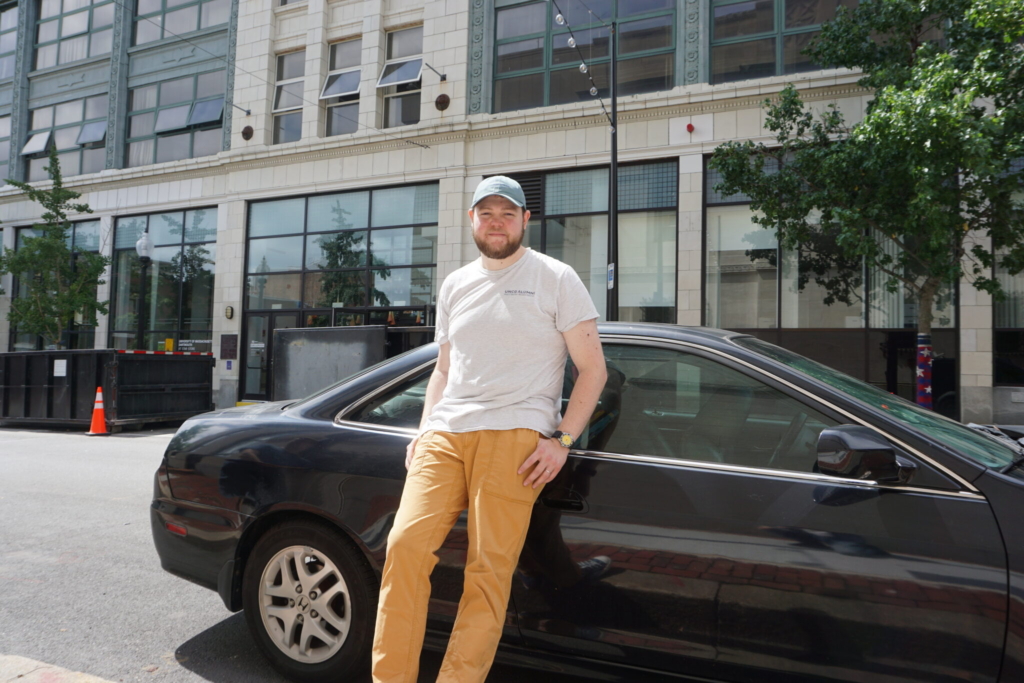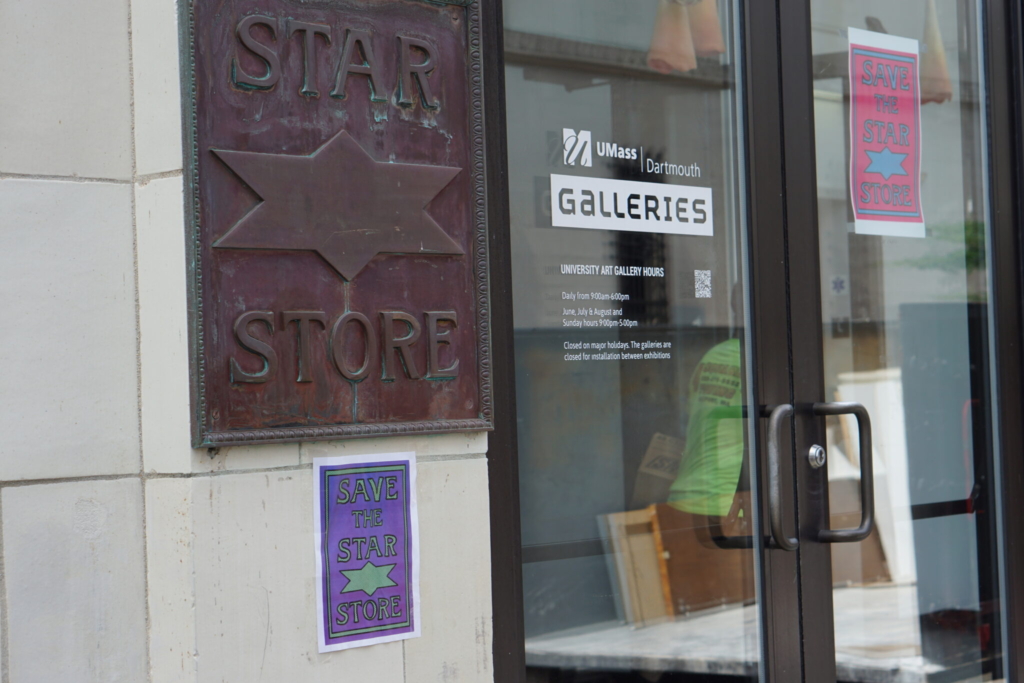WHILE STUDENTS ACROSS the state descend on campuses for fall move-in day, Monday was move out day for Zeph Luck.
With a backseat loaded with canvases, the 26-year-old grad student was making his third and last trip to clear all his paintings out of the downtown New Bedford studio where he’s been working for two years toward a master’s degree in fine arts at the University of Massachusetts Dartmouth.
Two weeks ago, the university announced with no warning that its College of Visual and Performing Arts would be vacating the Star Store, a former department store in the heart of the city that had been its home for more than 20 years. Students and staff were given two and half weeks of notice to clear everything from the building, while the university began scrambling to find space to accommodate them on its campus five miles away in rural Dartmouth.
The move came after the Legislature, which has funded lease payments for the building for more than two decades, dropped the line item from the 2024 budget approved earlier this month.
The announcement has been met with anger from students, who were drawn to the light-filled studio spaces of the massive stone building and vitality of an urban setting, and from local elected officials and civic leaders, who say the college program played a crucial role in jumpstarting New Bedford’s arts and culture renaissance.At this point, however, that anger seems to be morphing into quiet resignation.
“It sucks, but there’s nothing we can do about it,” said Luck, as he got ready to pull away from the curb with the final load of paintings and other material he was moving out of the building.
That unvarnished assessment seems to be a pithy summary of where things stand.

“It sucks, but there’s nothing we can do about it,” said Zeph Luck, a grad student in fine arts about the abrupt exit of the UMass Dartmouth arts college from the downtown New Bedford building that’s been its home for 22 years. (Photo by Michael Jonas)
Appeals to University of Massachusetts president Marty Meehan have gone nowhere, and Gov. Maura Healey’s office offered a curt response when asked about the outcry over the announcement, suggesting she’s not about to step in and put the brakes on the move.
When the visual arts college landed in the renovated building in 2001, it was heralded as a major step in New Bedford’s effort to remake itself into the arts and culture center of the South Coast. About 130 of the visual arts college’s 500 students have been taking classes or had studio space in the building. No one was prouder of the move than New Bedford state Sen. Mark Montigny, a UMass Dartmouth graduate who spearheaded the effort to have the university set up its arts program in his hometown.
At the time, downtown New Bedford was “empty and desolate,” said Montigny, recalling how he convinced the then-UMass Dartmouth chancellor “to think way outside the box” and be part of a revitalization push in the city rather than build new arts facilities on its Dartmouth campus.
In 2001, the state signed a 20-year lease with a local developer who had taken over the vacant department store building from the city redevelopment office. The lease payments were intended to go, in part, toward maintenance and capital improvements in the building, with the agreement giving the state an option to buy the building for $1 at the end of the 20-year run.
“Save the Star Store” posters call for the arts program to remain, but the building was nearly empty earlier this week, with moving trucks at its loading dock and dumpsters in front it where workers were tossing bags of garbage. (Photo by Michael Jonas)
With art galleries and restaurants giving it new life, a whaling museum that has turned the city’s one-time economic lifeblood into a cultural draw, and a $31 million renovation on tap for the Zeiterion theater across from the Star Store building, New Bedford today “is not the place I grew up in,” said Montigny.
Mark Muro, senior fellow at the Washington-based Brookings Institution, says locating the arts college downtown was an early example of “place-based industrial policy,” a movement now gaining ground in which public investments are made strategically to help locations or regions that have been left behind amid worsening economic divides.
“The interplay of educational and cultural institutions with urban centers is becoming more important and is more widely recognized as a part of economic growth,” said Muro.
To keep that growth on track, Montigny says the state should have moved to take ownership of the Star Store building after shelling out $2.7 million a year in rent payments for two decades. But ever since the original lease expired in August 2021, the state has seemed less than enthusiastic about owning the block-long behemoth, with its multimillion-dollar upkeep costs.
The state balked at taking ownership of the building in 2021, instead signing a one-year extension of the lease, after which it just continued making monthly rental payments.
Montigny said he exchanged text messages last summer with then-Gov. Charlie Baker and spoke with then-Lt. Gov. Karyn Polito over concerns that the state was about to forfeit its rights by not notifying the building owner it intended to exercise the purchase option at least 30 days before the lease extension expired on August 15. He said they assured him there was nothing to worry about. Even after the 30-day deadline passed, he said he was told by Polito that state officials were confident they could still exercise the option, even if they had to go to court to enforce it.
In an amendment he added last summer to the 2023 state budget, Baker directed the University of Massachusetts Building Authority to exercise the purchase option by August 15, 2022.
On August 10 last year, state officials wrote to building owner Paul Downey saying they wanted to exercise the purchase option. He wrote back the following day saying the state had missed its deadline and that the option was void.
Rather than pursue the case, however, the state seems to have dropped its interest in acquiring the building.
The UMass Building Authority did not respond to multiple messages.
Montigny wrote last week to Healey urging her to intervene. New Bedford Mayor Jon Mitchell said he spoke to UMass president Marty Meehan and Lt. Gov. Kim Driscoll, asking them to step in and work to save the Star Store campus.
Meehan’s office declined to comment.
Healey’s spokesperson, Karissa Hand, offered little reason for hope on the issue.
“We have received Senator Montigny’s letter and are aware of the concerns raised by the community. I don’t have further comment at this time,” she said.
Despite the state’s initial move last summer to try to exercise the purchase option, millions of dollars in capital needed to update and maintain the building seem to be the reason why the state has walked away from any purchase deal.
In a letter this week to the UMass Dartmouth community, Mark Fuller, the campus chancellor, provided the first clear statement that the university did not want to take ownership of the building.
“Our inability to take on another $50M-$75M in deferred maintenance made that financially impossible,” Fuller wrote.
Montigny insists that state funding for the building’s capital and operating needs would have been forthcoming. “That’s the easiest part of this,” he said.
He pointed to $8 million earmarked for the building in a 2018 bond bill, but that only authorizes the state to spend the money, it doesn’t guarantee it. Baker included $20 million for the building’s capital needs in a supplemental budget he filed last September – after signing at the legislation directing the UMass Building Authority to exercise the purchase option on the Star Store –- but the spending plan was never taken up by the Legislature. That may have been the final blow to efforts to see the state try to take the building.
While Montigny has been the biggest champion of the arts college’s move to New Bedford, his aggressive push for the state to acquire the Star Store building, ironically, is being cited as the cause of its abrupt exit.
Montigny says it’s wrong to have “another nickel” of taxpayer money “squandered” on lease payments to the private owner of the building, which the state should be taking possession of. In an effort to force that issue, the Senate did not include the annual $2.7 million appropriation for lease payments that the state has made for more than two decades in its 2024 budget proposal. The House and the governor included the money, but it was left out of the final budget that was negotiated and signed earlier this month.
The move seems to have backfired. Instead of spurring the state to pursue its purchase option, with no funding allocated for rental payments, UMass Dartmouth said it had no choice but to quickly vacate the building.
Fuller, the campus chancellor, said in his message earlier this week that the university had “advocated strongly” for the lease funding to continue in the state budget, suggesting the university would have remained in the building as a tenant.
Mitchell, the New Bedford mayor, said in a radio interview last week that the budget brinkmanship was a bad move. “I don’t think it was wise to cut the money out as a way of playing chicken with the UMass system. I think this was a mistake,” he said.
For his part, Montigny says the revitalization the arts campus helped spur is strong enough that downtown New Bedford will continue its comeback even without the UMass program there. “But we’re losing something that was a gem,” he said, calling the arts college “a crown jewel of the arts and culture” effort.
Muro, of the Brookings Institution, said the university’s exit comes as the federal government, through several big initiatives totaling $80 billion in spending, is increasingly recognizing the role of place-based policy aimed at spurring economic development.“It’s a shame,” Muro said of the turn of events in New Bedford. “It’s probably not the end of the world, but it’s a step backwards at a time when having a concentration of people, research, and culture together is becoming more, not less, important.”
"Exit" - Google News
August 30, 2023 at 09:09PM
https://ift.tt/kLgEdxq
UMass Dartmouth exit a tough blow for New Bedford - CommonWealth magazine
"Exit" - Google News
https://ift.tt/UW3fkgP
https://ift.tt/hFzWL0O
Bagikan Berita Ini
















0 Response to "UMass Dartmouth exit a tough blow for New Bedford - CommonWealth magazine"
Post a Comment